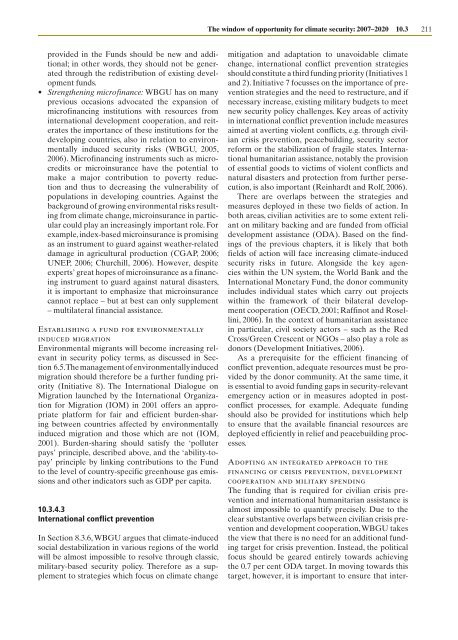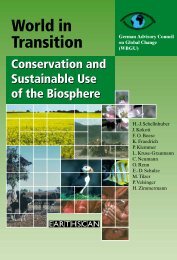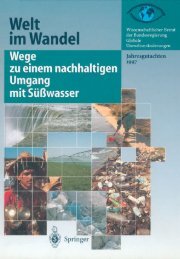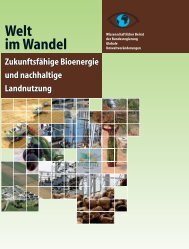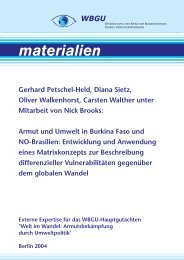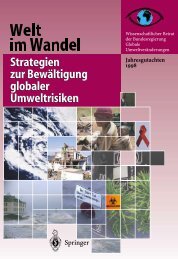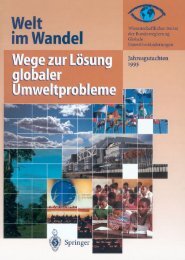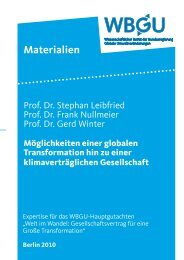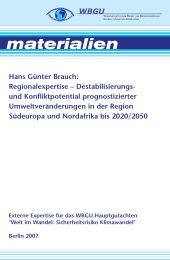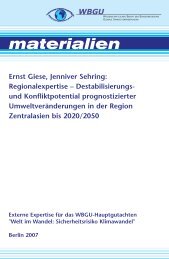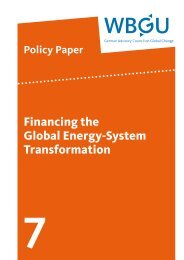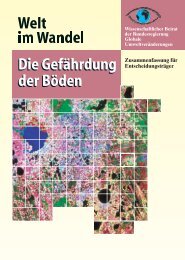World in Transition: Climate Change as a Security Risk - WBGU
World in Transition: Climate Change as a Security Risk - WBGU
World in Transition: Climate Change as a Security Risk - WBGU
You also want an ePaper? Increase the reach of your titles
YUMPU automatically turns print PDFs into web optimized ePapers that Google loves.
provided <strong>in</strong> the Funds should be new and additional;<br />
<strong>in</strong> other words, they should not be generated<br />
through the redistribution of exist<strong>in</strong>g development<br />
funds.<br />
Strengthen<strong>in</strong>g microf<strong>in</strong>ance: <strong>WBGU</strong> h<strong>as</strong> on many<br />
previous occ<strong>as</strong>ions advocated the expansion of<br />
microf<strong>in</strong>anc<strong>in</strong>g <strong>in</strong>stitutions with resources from<br />
<strong>in</strong>ternational development cooperation, and reiterates<br />
the importance of these <strong>in</strong>stitutions for the<br />
develop<strong>in</strong>g countries, also <strong>in</strong> relation to environmentally<br />
<strong>in</strong>duced security risks (<strong>WBGU</strong>, 2005,<br />
2006). Microf<strong>in</strong>anc<strong>in</strong>g <strong>in</strong>struments such <strong>as</strong> microcredits<br />
or micro<strong>in</strong>surance have the potential to<br />
make a major contribution to poverty reduction<br />
and thus to decre<strong>as</strong><strong>in</strong>g the vulnerability of<br />
populations <strong>in</strong> develop<strong>in</strong>g countries. Aga<strong>in</strong>st the<br />
background of grow<strong>in</strong>g environmental risks result<strong>in</strong>g<br />
from climate change, micro<strong>in</strong>surance <strong>in</strong> particular<br />
could play an <strong>in</strong>cre<strong>as</strong><strong>in</strong>gly important role. For<br />
example, <strong>in</strong>dex-b<strong>as</strong>ed micro<strong>in</strong>surance is promis<strong>in</strong>g<br />
<strong>as</strong> an <strong>in</strong>strument to guard aga<strong>in</strong>st weather-related<br />
damage <strong>in</strong> agricultural production (CGAP, 2006;<br />
UNEP, 2006; Churchill, 2006). However, despite<br />
experts’ great hopes of micro<strong>in</strong>surance <strong>as</strong> a f<strong>in</strong>anc<strong>in</strong>g<br />
<strong>in</strong>strument to guard aga<strong>in</strong>st natural dis<strong>as</strong>ters,<br />
it is important to emph<strong>as</strong>ize that micro<strong>in</strong>surance<br />
cannot replace – but at best can only supplement<br />
– multilateral f<strong>in</strong>ancial <strong>as</strong>sistance.<br />
Establish<strong>in</strong>g a fund for environmentally<br />
<strong>in</strong>duced migration<br />
Environmental migrants will become <strong>in</strong>cre<strong>as</strong><strong>in</strong>g relevant<br />
<strong>in</strong> security policy terms, <strong>as</strong> discussed <strong>in</strong> Section<br />
6.5. The management of environmentally <strong>in</strong>duced<br />
migration should therefore be a further fund<strong>in</strong>g priority<br />
(Initiative 8). The International Dialogue on<br />
Migration launched by the International Organization<br />
for Migration (IOM) <strong>in</strong> 2001 offers an appropriate<br />
platform for fair and efficient burden-shar<strong>in</strong>g<br />
between countries affected by environmentally<br />
<strong>in</strong>duced migration and those which are not (IOM,<br />
2001). Burden-shar<strong>in</strong>g should satisfy the ‘polluter<br />
pays’ pr<strong>in</strong>ciple, described above, and the ‘ability-topay’<br />
pr<strong>in</strong>ciple by l<strong>in</strong>k<strong>in</strong>g contributions to the Fund<br />
to the level of country-specific greenhouse g<strong>as</strong> emissions<br />
and other <strong>in</strong>dicators such <strong>as</strong> GDP per capita.<br />
10.3.4.3<br />
International conflict prevention<br />
In Section 8.3.6, <strong>WBGU</strong> argues that climate-<strong>in</strong>duced<br />
social destabilization <strong>in</strong> various regions of the world<br />
will be almost impossible to resolve through cl<strong>as</strong>sic,<br />
military-b<strong>as</strong>ed security policy. Therefore <strong>as</strong> a supplement<br />
to strategies which focus on climate change<br />
The w<strong>in</strong>dow of opportunity for climate security: 2007–2020 10.3<br />
mitigation and adaptation to unavoidable climate<br />
change, <strong>in</strong>ternational conflict prevention strategies<br />
should constitute a third fund<strong>in</strong>g priority (Initiatives 1<br />
and 2). Initiative 7 focusses on the importance of prevention<br />
strategies and the need to restructure, and if<br />
necessary <strong>in</strong>cre<strong>as</strong>e, exist<strong>in</strong>g military budgets to meet<br />
new security policy challenges. Key are<strong>as</strong> of activity<br />
<strong>in</strong> <strong>in</strong>ternational conflict prevention <strong>in</strong>clude me<strong>as</strong>ures<br />
aimed at avert<strong>in</strong>g violent conflicts, e.g. through civilian<br />
crisis prevention, peacebuild<strong>in</strong>g, security sector<br />
reform or the stabilization of fragile states. International<br />
humanitarian <strong>as</strong>sistance, notably the provision<br />
of essential goods to victims of violent conflicts and<br />
natural dis<strong>as</strong>ters and protection from further persecution,<br />
is also important (Re<strong>in</strong>hardt and Rolf, 2006).<br />
There are overlaps between the strategies and<br />
me<strong>as</strong>ures deployed <strong>in</strong> these two fields of action. In<br />
both are<strong>as</strong>, civilian activities are to some extent reliant<br />
on military back<strong>in</strong>g and are funded from official<br />
development <strong>as</strong>sistance (ODA). B<strong>as</strong>ed on the f<strong>in</strong>d<strong>in</strong>gs<br />
of the previous chapters, it is likely that both<br />
fields of action will face <strong>in</strong>cre<strong>as</strong><strong>in</strong>g climate-<strong>in</strong>duced<br />
security risks <strong>in</strong> future. Alongside the key agencies<br />
with<strong>in</strong> the UN system, the <strong>World</strong> Bank and the<br />
International Monetary Fund, the donor community<br />
<strong>in</strong>cludes <strong>in</strong>dividual states which carry out projects<br />
with<strong>in</strong> the framework of their bilateral development<br />
cooperation (OECD, 2001; Raff<strong>in</strong>ot and Rosell<strong>in</strong>i,<br />
2006). In the context of humanitarian <strong>as</strong>sistance<br />
<strong>in</strong> particular, civil society actors – such <strong>as</strong> the Red<br />
Cross/Green Crescent or NGOs – also play a role <strong>as</strong><br />
donors (Development Initiatives, 2006).<br />
As a prerequisite for the efficient f<strong>in</strong>anc<strong>in</strong>g of<br />
conflict prevention, adequate resources must be provided<br />
by the donor community. At the same time, it<br />
is essential to avoid fund<strong>in</strong>g gaps <strong>in</strong> security-relevant<br />
emergency action or <strong>in</strong> me<strong>as</strong>ures adopted <strong>in</strong> postconflict<br />
processes, for example. Adequate fund<strong>in</strong>g<br />
should also be provided for <strong>in</strong>stitutions which help<br />
to ensure that the available f<strong>in</strong>ancial resources are<br />
deployed efficiently <strong>in</strong> relief and peacebuild<strong>in</strong>g processes.<br />
Adopt<strong>in</strong>g an <strong>in</strong>tegrated approach to the<br />
f<strong>in</strong>anc<strong>in</strong>g of crisis prevention, development<br />
cooperation and military spend<strong>in</strong>g<br />
The fund<strong>in</strong>g that is required for civilian crisis prevention<br />
and <strong>in</strong>ternational humanitarian <strong>as</strong>sistance is<br />
almost impossible to quantify precisely. Due to the<br />
clear substantive overlaps between civilian crisis prevention<br />
and development cooperation, <strong>WBGU</strong> takes<br />
the view that there is no need for an additional fund<strong>in</strong>g<br />
target for crisis prevention. Instead, the political<br />
focus should be geared entirely towards achiev<strong>in</strong>g<br />
the 0.7 per cent ODA target. In mov<strong>in</strong>g towards this<br />
target, however, it is important to ensure that <strong>in</strong>ter-<br />
211


